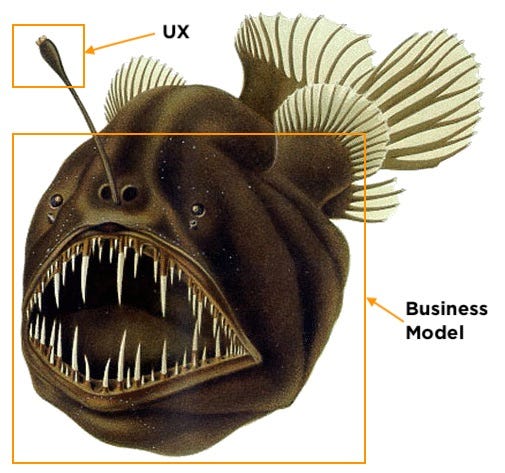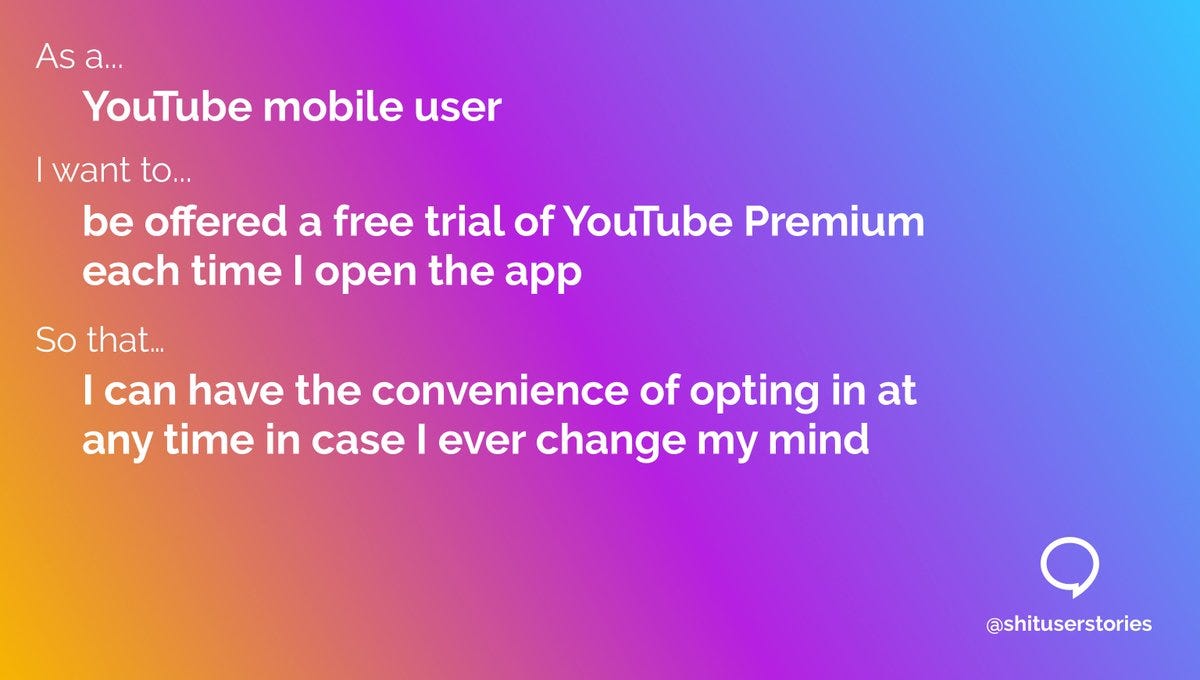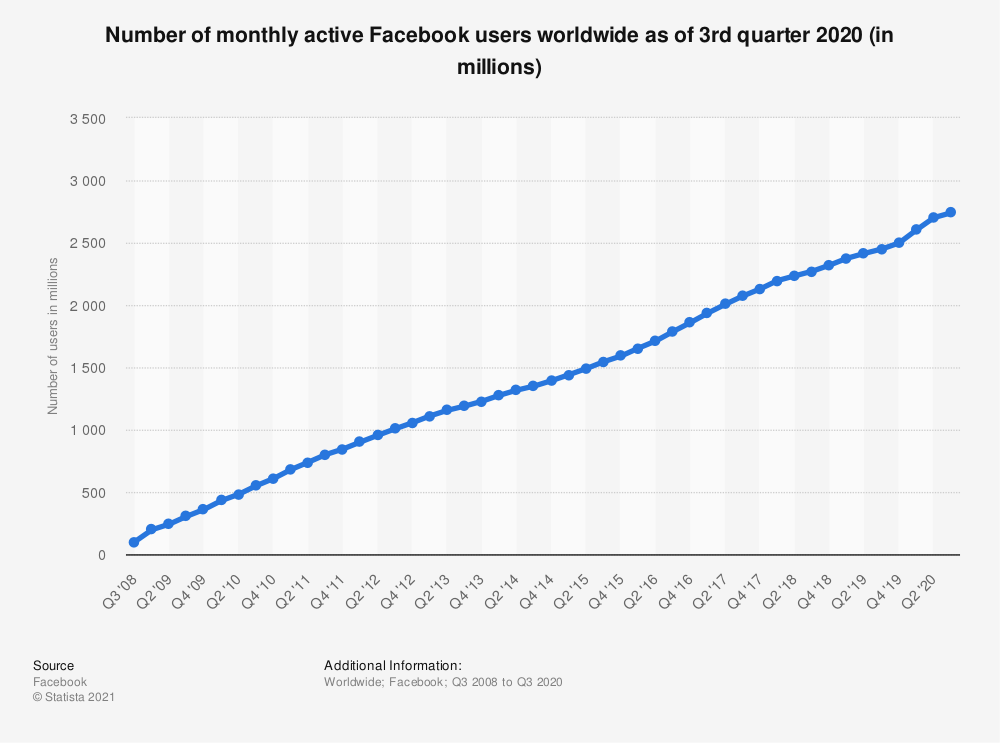Welcome to Transmissions by me, Martin Brown. Father. Husband. Designer at Craig Walker and lecturer at RMIT. Marty to most.
This is officially the first of what I hope will be a fortnightly newsletter that collates some of the more interesting stories, links, quotes and other curios that float my way.
If you’re new here, then sign up now to get more of these in your inbox, and don’t forget to tell your friends!
Design
Why I'm losing faith in UX
Mark Hurst
Provocative essay by Mark Hurst of Creative Good, who recasts UX as a mask for ‘User Exploitation’. His thesis is that, especially in big-tech, the digital user experience has become captive to The Business Model, citing Amazon’s six page, dark-pattern- smorgasbord of a cancellation flow.
It’s a similar pattern that’s been picked up, more humorously, by twitter account @shituserstories.
It’s a simplified narrative, and one I think that speaks more to the simple fact that once companies know they have a captive audience, they will happily squeeze their users with extractive experiences up until the point of rage. I feel the same way about Amazon having a 6 page cancellation flow as I do about being forced to buy a $12 popcorn at the cinemas. I’m not thrilled, but I’m not surprised.
What happened to all the logotypes?
Twitter thread
There’s typically a shudder of horror whenever a venerated brand changes their logotype. Part of this just the shock of the new, but there’s a particular lament when we see that yet another distinctive wordmark metamorphosing into a bland, generic san-serif. It’s like a butterfly turning back into a caterpillar. This Twitter thread is worth reading, as it explores this phenomenon in some depth, but also looks at why this is happening. (TLDR: it’s the increasing amount of digital contexts)
A 10-billion pixel scan of Girl with a Pearl Earring
Seeing Vermeer’s sub-milllimeter brushwork precision here is truly extraordinary.
Ideas
It was Bill Clinton who coined the phrase ‘watch the trend-line, not the headline.’ It has to do with the notion that the long term trends that really make a meaningful difference to the world are often obscured in the short-term by what makes for a salacious headline. News is an attention business, and, as social media companies have discovered much to their chagrin, negative, emotive, conflict-ridden stories tend to propagate much more so than slow, accretive stories of gradual change. But to get at the truth, you need to keep looking for the ‘boring’ stories of gradual change, and try to bypass a lot of the hyperbole of the twittersphere.
Harvard professor Steven Pinker, in The Better Angels of Our Nature, wrote a whole book where he stressed this point repeatedly,
A recent example that caught my eye: Australian exports booming despite trade restrictions from China
Despite the rhetoric from both sides, the threats of Australian lobsters dying at Chinese airports, and much bubble and froth – lo and behold China is still buying a LOT of our stuff. Last year, in some industries, more than ever before. So before coming to a conclusion about what we should think about China, watch the trend-line, not the headlines.
Another example shows clearly the impact that acres and acres of negative press coverage over the years have had on Facebook’s monthly average user numbers.
Not.
Why these discrepancies between the media narrative and the numbers over time? It’s hard to tell. It might be the incentives around what shareable on Twitter and what’s deemed newsworthy. Perhaps this speaks to the disconnect between the chattering classes and the majority of users (or people, as we sometimes like to call them). I don’t know.
Nevertheless it’s an important reminder to that outrage won’t necessarily translate into behaviour change, and that complex systems have hundreds of concurrent narratives, only a tiny few of which will ever become elevated to wider discourse or critique.
Quotes
From an extraordinary 1984 Paris Review interview with the science fiction writer J. G. Ballard (Crash, High Rise)
"Young people who take for granted that the state will provide free university education, free medical treatment, and prosperous consumer-goods economies, but who nonetheless seem to suspect that behind all this lies some unseen conspiracy. One sees the most extreme example in the Baader-Meinhof group in West Germany, whose terrorist acts seem totally meaningless and irrational. But, of course, that is the very point of those acts—in a totally sane society, madness is the only freedom.”
Other
Avi Loeb, a Harvard astrophysicist, argues that signs of intelligent extraterrestrial life have appeared in our skies. More persuasive than you would expect.
More Avi Loeb on Lex Fridman’s podcast.
And the inevitable downer counter-arguments.
Some very wise words uttered as two masters, Grayson Perry and Brain Eno, converse about the nature of art.
Dare we be positive about action on climate change? (Let it be so, Joe)
If this looks like a decent addition to your inbox, sign up now so you don’t miss the first issue, and don’t forget to tell your friends.









